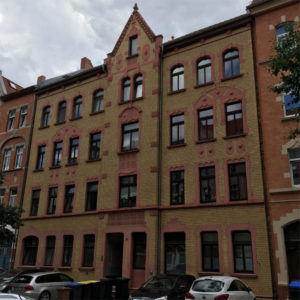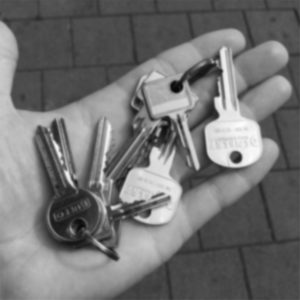Getting a German Apartment – Part Zwei
This post is a continuation of Getting a German Apartment.
Little did I know that the excitement of moving into a German apartment does not end with the signing of the rental contract. There were still matters of the security deposit and the anticipation of the apartment walkthrough (i.e., the key exchange ceremony).
The Security Deposit
Having discussed the process in high-level with the management company, I was aware that I needed to head to the bank after receiving the countersigned contract in order to set up the security deposit (tr., Kaution). So, receiving the said contract on the Wednesday before the walkthrough, I headed to the bank on the Thursday and proudly announced I had finally found a place to live. I then sheepishly learned that security deposits come in three forms: cash at the ceremony, a transfer of funds to the owner, or a new sub-account at my bank under the name of the owner. Apparently, the letter I received and the contract itself made no mention of which method was to be used.
Initial solution: the bank immediately called the management company to get clarity. Unfortunately, they were closed for the weekend. The banker then said that it is often not a problem to wait until after I have moved in to set up the security deposit. In the US, this is unheard of. I cannot think of any good reason to be so trusting to accept a deposit after the keys have been exchanged. Regardless, he told me not to worry and wished me a good weekend.
Friday morning at 9:15 AM, I received a call from an unknown number and choose to ignore it. Listening to the message, I learned that the banker heard back from the management company from an email he sent them. It was entirely unacceptable to settle the security deposit after the ceremony; it must be done in advance. The banker had already set up the new sub-account in my account, but I needed to get to the bank before they closed that day at 1:30 PM. Busses from Tambach-Dietharz leave every other hour. The next was at 9:31 AM and would get me to Erfurt at 11:30 AM; the next bus would get me to Erfurt right when the bank closed.
I did not know that the banker had reached out to the management company on my behalf, but I was truly glad that he did. If anyone is looking for a bank to use while in Germany, I would highly recommend BB Bank. They are something equivalent to a US credit union and have gone above and beyond every time I visit. Needless to say, we polished up the paperwork, and I was once again worry-free for the ceremony on the following Monday.
The Walkthrough (i.e., the key exchanging ceremony)
I arrived punctually for my appointment on Monday at 3 PM. Since I had arrived before the management company, I was able to talk a bit more with the previous tenant about things to watch out for. I also paid him for the kitchen, furniture, and basic dishes that he was leaving behind. Then arrived the company representative.
I am accustomed to the management company welcoming me, giving me the key(s), and then providing a sheet of paper with vague room titles where I can list any pre-existing damages or things that looked to be in disrepair. Along these lines, when I moved to San Francisco, I was not greeted nor was I given any starter paperwork; I was buzzed in through the front door, my apartment door was unlocked, the keys were in the freezer, and I was told to email them with anything that looked odd.
Similar to my experience helping my friends, a German family, rent a car in the US, the apartment walkthrough consisted of a pre-printed full, two-page document that listed every feature possible in an apartment. It is important to point out that German apartments come with a floor, walls, doors, and a bathroom; everything else is to be provided by the tenant (more on this later).
So, throughout this walkthrough, we commented on the floors, we commented on the walls, we commented on the color of the walls, then we looked at the windows and the heating unit, and then went to the next room. I started by pointing out poor quality of craftsmanship, such as ill-fitting trim or slightly-warped laminate; I was told this was not important. However, the spot of rust on the heating unit was duly noted. Was I to replace the heating unit if it were rusted during my stay? I guess I will find out when I move out. I am also unsure if the Germans take into consideration normal wear-and-tear when a tenant moves out. Or does the landlord have a hay-day with recouping maintenance costs?
After forty minutes to walk through a one-bedroom apartment, I was given over a dozen keys and was a resident of Erfurt. The former tenant then offered to drive me around to show me where the nearest grocery store and best Chinese restaurant were located. He then dropped me off near the downtown mall so I could begin preparing my new home.
During the walkthrough, the former tenant pointed out what was being unexpectedly left behind for me. He left me a large mirror and a key holder near the front door; all I could think of are the holes in the walls that I somehow need to fill. Additionally, he mentioned something about the fuse box being blocked by the built-in refrigerator, and that the kitchen light switch may need to be moved back after removing the kitchen. There has got to be a service for this type of stuff.
Finally, I learned that apartments do not come with light fixtures, as “each person has their own taste”. So, I am currently sitting in the dark writing this, waiting until a time that I eventually go out and buy a light fixture and learn how to connect it to the wires hanging from the ceiling.
Utilities
As mentioned in the first apartment post, the cost of the German rent is broken down between cold rent and the additional utilities (water, heat, garbage, cleaning service, and winter services), which total to a warm rent. The tenant is then responsible for electricity, gas (if applicable), and internet. I spent the week setting up and figuring out these utilities.
There are a slew of electricity providers, and as such there is a website that you can use to compare prices. They are all ridiculously costly compared to the US, and they attempt to differentiate themselves through eco-friendly options or perks like free monthly termination. As I am hesitant to do a lot of research (also known as lazy), I simply used one a choir buddy is using – we both get a €20 rebate!
The complication is that you have to guess what your monthly usage will be. The sites do provide some guidance, but if you underestimate, you will be footing a huge year-anniversary bill. If you overestimate, you are returned the money. As a single person who will be making many fermented products (i.e., boiling things), I tried to up the estimated usage, but I will probably be unpleasantly surprised a year from now.
Internet options also exist, but in this case I went with the carrier that the previous tenant had since I knew that this apartment was set up to accept their service. The company is one of the large ones in the area and touted a free router, so I signed up only to find out that I had to pay for the delivery of the router as well as €40 to have someone come out and “flip a switch to turn on the service”. I do believe I am actually paying for that router in a very roundabout way.
Settling In
With all this activity, I watch as my bank account here quickly dwindles. However, I know that things will settle again, and I can find my way back into a healthy budget. I have sheets and bedding, dishes and silverware, computer and monitor, and plenty of sausage and bread.
I am now settled and excited for this adventure to continue. Now to register my new address with the police and meet the staff of the local Foreigner’s Office.




Hi there! I just wish to give you a big thumbs up
for your excellent information you have right here
on this post. I’ll be returning to your web site for more soon.
Appreciate this post. Will try it out.